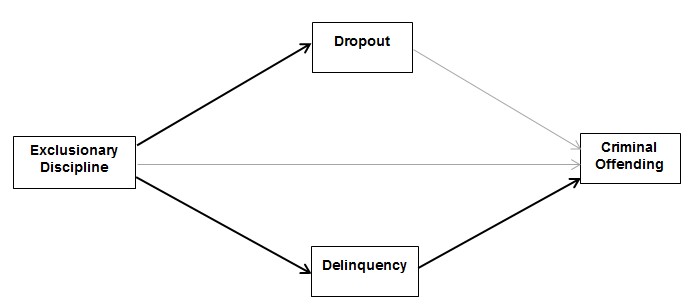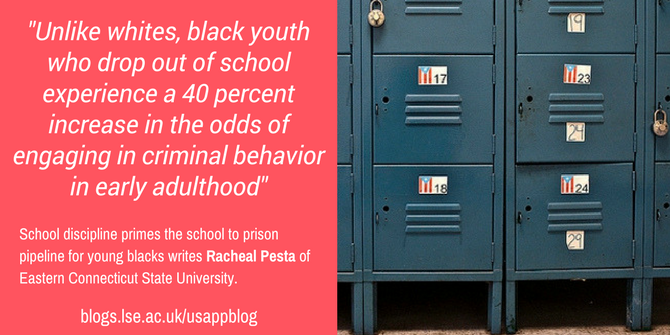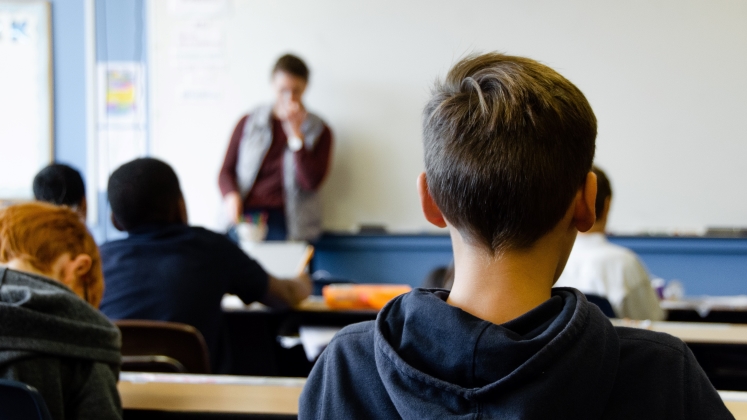 The link between students being involved with exclusionary disciplinary policies such as suspension and expulsion and their later involvement with the criminal justice system as an adult is relatively well known. But is there a racial component to this school to prison pipeline? In new research, Racheal Pesta used national data to examine the relationship between students’ race and their suspension and expulsion, educational achievement, delinquent behaviors, and later criminal offending. She finds that for both black and white students, being expelled or suspended increases the chance of dropping out by more than 300 percent, but that black youth who drop out of school are 40 percent more likely to engage in criminal behavior in adulthood, while for whites dropping out does not increase the odds of criminal offending.
The link between students being involved with exclusionary disciplinary policies such as suspension and expulsion and their later involvement with the criminal justice system as an adult is relatively well known. But is there a racial component to this school to prison pipeline? In new research, Racheal Pesta used national data to examine the relationship between students’ race and their suspension and expulsion, educational achievement, delinquent behaviors, and later criminal offending. She finds that for both black and white students, being expelled or suspended increases the chance of dropping out by more than 300 percent, but that black youth who drop out of school are 40 percent more likely to engage in criminal behavior in adulthood, while for whites dropping out does not increase the odds of criminal offending.
Race, School Discipline, and the School-to-Prison Pipeline
According to the US Bureau of Justice Statistics that more than half of all local, state, and federal inmates never completed high school. One major contributor to the relationship between school failure and involvement in the criminal justice system is the increased use of exclusionary disciplinary policies such as, out-of-school suspension and expulsion, which disproportionately affect black students. The link between exclusionary policies and eventual involvement with the criminal justice system has been aptly named the “school-to-prison pipeline.” This is because out-of-school suspension and expulsion are associated with increased risk of dropout, delinquency, and criminal offending which are often considered pipeline benchmarks that keep students on a trajectory towards incarceration.
While racial disproportionality in exclusionary discipline exists, there is less knowledge about how this translates to future life outcomes across race. In other words, are all students, regardless of race, which are suspended or expelled just as likely to travel through the pipeline? Using Waves I-III from the National Longitudinal Study of Adolescent and Adult Health, which provides information on student background factors, suspension and expulsion, educational achievement, delinquent behaviors, and criminal offending, I examined these relationships (Figure 1) for both black and white students.
Figure 1 – Conceptual Map of the School-to-Prison Pipeline

The Differing Impact of School Discipline across Race
At the core of the concept of the school-to-prison pipeline construct is the idea that exclusionary discipline begins a series of events that stigmatizes and pushes students out of school and into justice system. Research suggests that being labeled a “troublemaker” in school has detrimental effects on future educational achievement as well as increasing the risk for delinquency and other future problem behaviors. My study indicates however that the consequences of these negative labels are not equal across racial groups. The darker lines in Figures 2 and 3 highlight the significant relationships between exclusionary discipline and subsequent negative outcomes.
Figure 2 – White Sample (N=2805)

As you can see, for whites being suspended or expelled increases the odds of dropping out of school three-fold (316 percent). Yet for whites, dropping out of school does not increase the odds of criminal offending. Contrary to much of the school discipline literature, being suspended or expelled actually decreases the odds of engaging in delinquency by 19 percent. However, it appears that when white students do in fact engage in delinquent behaviors their likelihood of participating in criminal offending in early adulthood does increase by 7 percent.
Similar to whites, being suspended or expelled increases the odds of dropping out of school by 316 percent for black students. However, unlike whites, black youth who drop out of school experience a 40 percent increase in the odds of engaging in criminal behavior in early adulthood. And perhaps most startling is that exclusionary discipline has a direct effect on the likelihood of criminal offending. For black youth, being suspended or expelled increases the odds of offending in early adulthood by 38 percent.
Figure 3 – Black Sample (N=1065)

Overall, black youth experience more negative outcomes from suspension and expulsion than their white peers. While both black and white students have similar odds of dropping out of school after being suspended or expelled, only black students are more likely to engage in criminal offending after dropping out of school. Moreover, suspension or expulsion leads directly to criminal offending in adulthood for black youth only. Last, being suspended or expelled acts as a protective factor by decreasing the odds of engaging in delinquency among white youth.
What Does This Mean and Where Do We Go From Here?
Our findings about the racial differences in the consequences of exclusionary discipline align themselves with much of the studies on labeling and stigmatization which suggests that not only do racial minorities face more exclusionary reactions to negative labels, but they may also have fewer resources to cope with such responses.
For example, studies have found that whites are protected from the effects of negative labels due to more financial resources, connections within the justice system, and more lenient and private treatment from police and other institutions. For instance, I speculate that for white youth, dropping out of school does not translate to future criminal offending because they may have better employment options in spite of their failure to graduate. This suggests that whites may be able to drift into bad behavior in adolescence without experiencing the long-term stigmatizing effects that are experienced by blacks.

“_MG_9570” by Medill News21 is licensed by CC BY 2.0
While eliminating out-of-school suspension and expulsion is extremely unlikely, as in some instances it may be necessary, there are some improvements that can be made. Considering the wealth of studies documenting the racial disproportionality in the use of such polices a simple auditing system may help to improve the consistency and fairness in the application of school discipline. As a consequence of this disparity, racial minorities are likely to view punishment and school officials as illegitimate and unjust. Thus, rather than deterring negative behaviors, school punishment can actually intensify future problem behaviors.
In addition, one of detrimental consequences of exclusionary discipline is that once students are removed from school for extended periods of times they often experience difficulty reentering. Similar to the reintegration problems plaguing the prison system, reintegrating students back into the school environment can be a difficult task. My research supports this claim in that, following suspension or expulsion, students experience an increased risk for dropping out of school. This may signal to the challenges felt by students who have been labeled, stigmatized, and missed out on valuable instruction.
Sanctions, in this case school punishment, can be delivered in either “reintegrative” or “stigmatizing” ways; the former induces social shame on the act whereas the latter places shame on the actor. In other words, rather than doing a bad thing…you are a bad kid. Reintegrative shaming can work to reduce problem behaviors whereas stigmatizing shame increases it. Incorporating reintegrative shaming techniques may help to successfully integrate rather than isolate students from school environment.
- This article is based on the paper, ‘Labeling and the Differential Impact of School Discipline on Negative Life Outcomes: Assessing Ethno-Racial Variation in the School-to-Prison Pipeline’, in Crime & Delinquency.
Please read our comments policy before commenting
Note: This article gives the views of the author, and not the position of USAPP– American Politics and Policy, nor of the London School of Economics.
Shortened URL for this post: http://bit.ly/2HTwHKd
About the author
 Racheal Pesta – Eastern Connecticut State University
Racheal Pesta – Eastern Connecticut State University
Racheal Pesta is a faculty member in the Department of Sociology, Anthropology, Criminology, and Social Work at Eastern Connecticut State University. Her research interests include criminological theory, interpersonal violence, gender, and race. Her current research explores the impact of informal and formal sanctions on future life outcomes across race.






